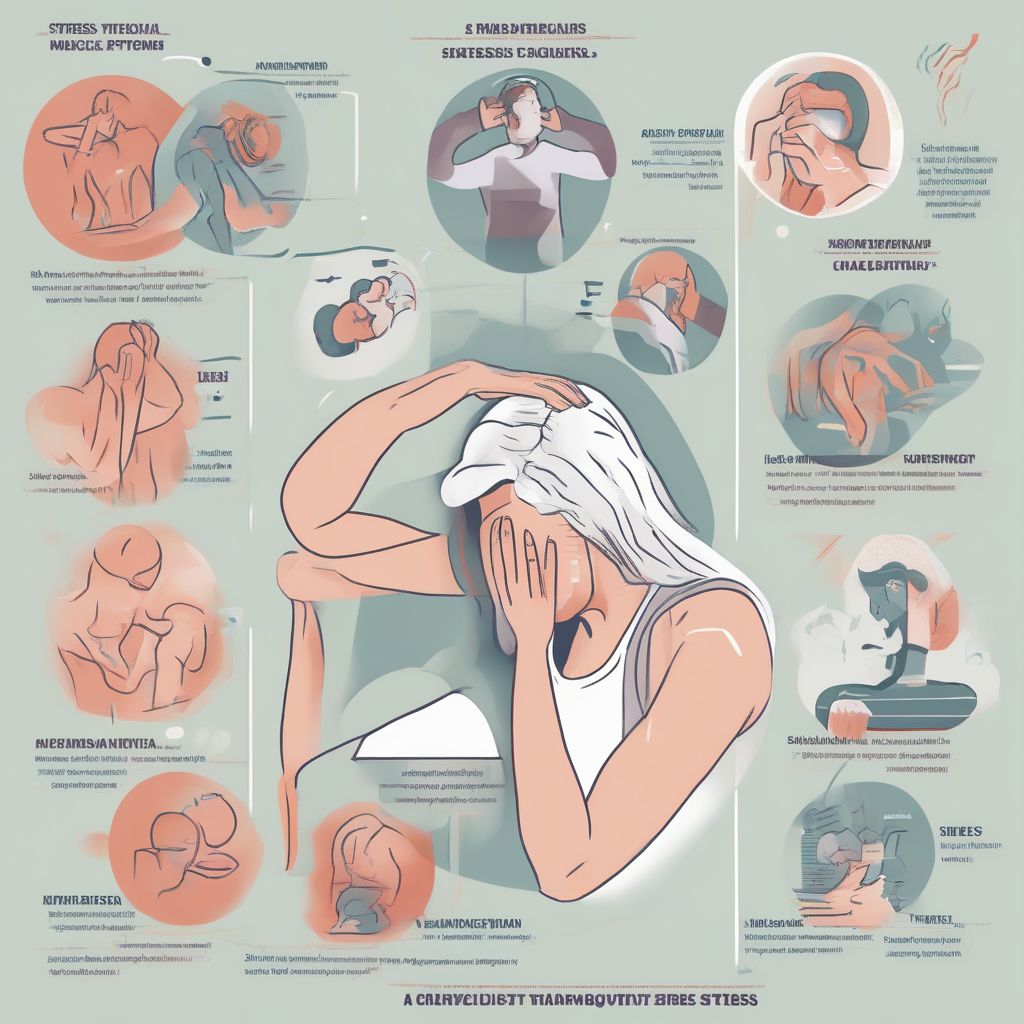We all experience stress from time to time. It’s a normal part of life. But when stress becomes chronic, it can take a serious toll on our physical and mental health. As a nutritionist and meal prep coach, I’ve seen firsthand how chronic stress can impact people’s lives. Let’s explore the signs of chronic stress and discuss practical strategies for addressing them.
Understanding Chronic Stress: Beyond Everyday Pressure
While everyday stressors are a natural part of life, chronic stress arises when these pressures persist without resolution. This continuous state of “fight or flight” can lead to a cascade of physical, emotional, and behavioral changes.
 Stress Symptoms
Stress Symptoms
Recognizing the Red Flags: Signs You Shouldn’t Ignore
Chronic stress can manifest in various ways, often subtly at first. Learning to recognize these signs is crucial for early intervention and preventing more severe consequences.
1. Physical Changes: When Your Body Sends Warning Signals
- Persistent Fatigue: Feeling constantly drained, even after a full night’s sleep.
- Sleep Disturbances: Difficulty falling asleep, staying asleep, or experiencing restless sleep.
- Digestive Issues: Changes in appetite, stomach pain, constipation, or diarrhea.
- Headaches and Muscle Tension: Frequent headaches, especially tension headaches, and muscle aches.
- Weakened Immune System: Getting sick more often or experiencing slower healing from injuries.
2. Emotional and Mental Shifts: Impacts on Mood and Well-being
- Irritability and Mood Swings: Feeling easily frustrated, short-tempered, or experiencing sudden shifts in mood.
- Anxiety and Worry: Persistent feelings of anxiety, nervousness, or excessive worrying.
- Difficulty Concentrating: Trouble focusing, remembering things, or making decisions.
- Social Withdrawal: Isolating oneself from social activities or avoiding interactions with others.
3. Behavioral Changes: Coping Mechanisms That Can Backfire
- Changes in Eating Habits: Overeating or undereating, craving unhealthy foods, or skipping meals.
- Increased Substance Use: Turning to alcohol, tobacco, or other substances as a way to cope.
- Procrastination and Avoidance: Delaying tasks, avoiding responsibilities, or neglecting self-care.
- Restlessness and Nervous Habits: Fidgeting, pacing, nail-biting, or other nervous habits.
Addressing Chronic Stress: A Multifaceted Approach
Effectively managing chronic stress often involves a combination of lifestyle changes, coping mechanisms, and professional support.
 Healthy Lifestyle Choices
Healthy Lifestyle Choices
1. Lifestyle Modifications: Building a Strong Foundation
- Prioritize Sleep: Aim for 7-9 hours of quality sleep each night. Establish a relaxing bedtime routine and create a sleep-conducive environment.
- Regular Exercise: Engage in at least 30 minutes of moderate-intensity exercise most days of the week.
- Balanced Nutrition: Focus on a diet rich in fruits, vegetables, whole grains, lean proteins, and healthy fats.
- Mindfulness and Relaxation: Practice mindfulness techniques like deep breathing, meditation, or yoga to calm the mind and body.
2. Stress-Busting Strategies: Tools for Coping
- Time Management: Organize your time effectively, prioritize tasks, and learn to delegate when possible.
- Healthy Boundaries: Set realistic limits on your time and energy. Learn to say no to requests that overwhelm you.
- Social Support: Connect with friends, family, or a support group to share your feelings and gain perspective.
3. Seeking Professional Help: When to Reach Out
- Therapy and Counseling: A therapist can provide coping strategies, address underlying issues, and teach stress management techniques.
- Medication: In some cases, medication might be recommended to address symptoms of anxiety or depression related to chronic stress.
Conclusion: Taking Control of Your Well-being
Chronic stress is not something to ignore. By understanding its signs and implementing effective strategies, you can regain control of your health and well-being. Remember, small changes can make a big difference over time.
If you’re feeling overwhelmed by chronic stress, don’t hesitate to reach out for support. Whether it’s a trusted friend, a healthcare professional, or a mental health expert, remember that you don’t have to face it alone.
What are some of your go-to stress-busting techniques? Share your tips and experiences in the comments below!
[amazon bestseller=”stress management”]
